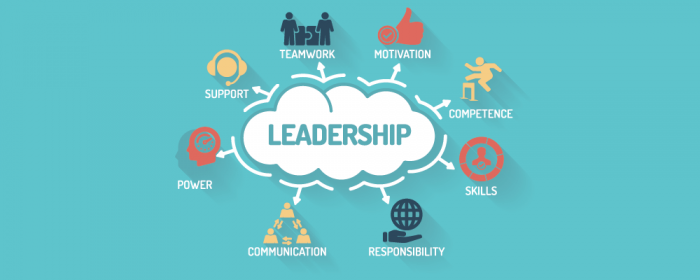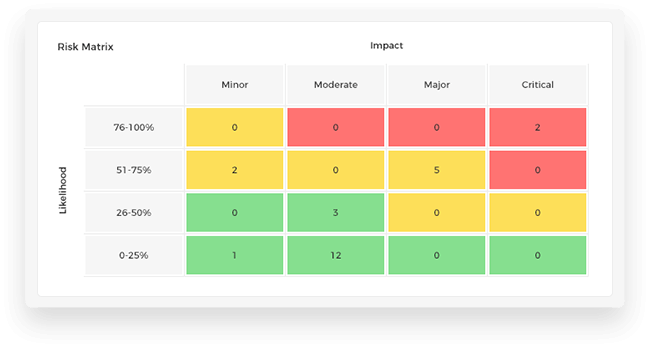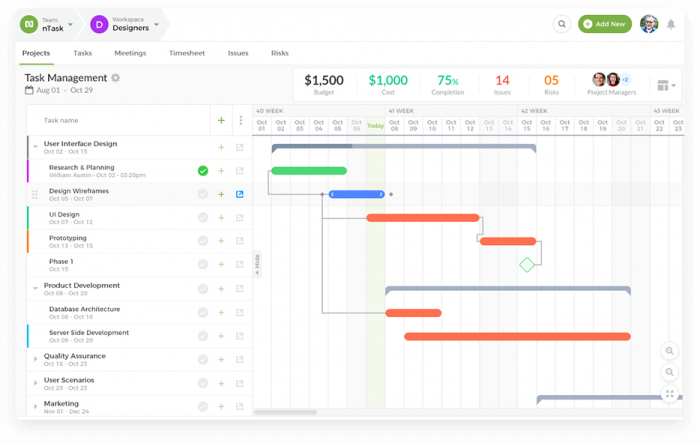With the project management field reaching new heights each day, it has become imperative that one must possess a distinct set of essential project management skills to achieve project success. A project manager needs to have special abilities for successfully executing projects from initiation till closure.
How critical is it to work on these skills is evident from statistics forecasting that by the year 2027, the need for skilled project management-oriented individuals will increase by 87.7 million. Another report by Project Management Institute implies that a project is 40% more likely to succeed if managers possess essential project management skills.
If you’re looking for a sure formula to success, acquiring and honing these skills should be one of your top priorities in 2024. Let’s explore them individually, and look at ways on how you can learn them:
The 23 Essential Project Management Skills of 2024
1. Leadership

The word leadership has been thrown around in multiple ways over the years and rightly so because you cannot expect to achieve your project objectives without a solid upper hand. Leadership is one of the most important project management skills that you need to possess if you’re an aspiring project manager.
A project manager with the right leadership style knows how to lead and motivate a team and make them in line with the strategic goals of a project. At any given point, he should know how to analyze the situation at hand and make informed decisions at the end of the day.
A true leader is a team’s biggest support at all times and it’s the glue that holds them together in good and bad times alike. He knows when is the right time to motivate the team and when to hold them accountable, all pertaining to project requirements.
2. Subject Matter Expertise

No matter how much knowledge you have in your field, there’s always room for more. In today’s digital world, trends come and go like the wind. If you’re not quick enough to identify your forte, it might be too late.
A successful project manager knows enough about what’s going on and how it’s going to be done. Sound knowledge of the subject allows the project manager to communicate effectively with the team and all the stakeholders to get things done faster. AND, it can help you identify your strengths as well (win-win?).
Current market trends can also set the base for what needs to be learned over time and how to implement it on your projects for heading in the right direction.
Start here to become a project management expert:
3. Communication

One of the most essential project management skills has to be communication. Successful project managers know exactly what needs to be communicated and how. Great communication is a recipe for a great relationship.
This goes without saying – if you don’t have what it takes to effectively communicate your point across, you’re already one step behind. The ability to communicate your vision, goals, as well as what’s deemed necessary for empowering the team should be one of your core skills.
A general rule here says that you need to be eloquent, directive, and simple when it comes to communicating with your team members. The lingo that you use matters too. It’s quite common to use the industry acronyms, but you need to communicate in the language your team members can easily decipher and act upon.
4. Negotiation

If you ever found yourself caught in a situation that required exceptional negotiating skills, you would understand how important it is to possess them. For mutual gains, you got to have excellent negotiation abilities or you’ve lost the battle of getting the best for you and your team.
An accomplished project manager knows how to negotiate terms with suppliers, clients, and other stakeholders so as to ensure a win-win situation.
It doesn’t end here. As a project manager, you’ll find yourself caught in a constant battle of negotiating the time and again with your team members too. A new hire, some inevitable employee conflict, or merely bringing everyone in line with the strategic goals. It’s a never-ending cycle.
Negotiating also brings everyone’s interests on the same page and makes everyone believe they’re getting what they want. (Pretty smart, no?)
So, the next time someone points out that you’re being diplomatic, know that you possess great negotiating skills. 😉
5. Organization

You cannot expect to get things together if you don’t have organization skills. This holds true for both your professional and personal life. You can be at the top of your game if you know how to organize and prioritize multiple complicated tasks and execute them smoothly.
As a project manager, your job is to make sure that your projects do not create chaos among your team members and they don’t feel overwhelmed by the number of tasks lying ahead of them. An important element of being organized also includes neatly documenting everything for future reference.
A small tip can be to start getting organized personally using a to-do list app, and everything else will slowly fall into place.
6. Team Management

Team management goes hand in hand with successful project execution and this should be one of the project management skills you should definitely start working upon if you want to lead by example.
Bringing together a team on common grounds in no child’s play. An effective project manager is skillful enough to move the team in one direction and makes sure that their personal goals are aligned with the organizational goals.
Delegating tasks responsibly, handling conflicts, and evaluating performance effectively sets the basis for great team management. Another important attribute of a successful project manager is that he/she evaluates each and every team member and helps them in polishing their skills over time to the best of their capabilities.
Use software to manage your team:
7. Time Management

As William Penn rightly said, ‘Time is what we want most, but what we use worst’. Time management is a skill not many people possess, but it’s considered to be one of the key skills for project managers.
As every project comes with a due date, there are hundreds of tasks that need to be done within a short period of time, so the real work begins with task prioritization. Start with devising a powerful project timeline, and make sure that these deadlines are met throughout the project lifecycle.
Prioritize and assign tasks according to the work breakdown structure (WBS) and get a clear picture of what needs to be done over the course of the project timeline.
As a result of good time management, your team’s productivity will drastically improve and will directly impact your team’s performance.
8. Risk Management

Risks are inevitable, which is why essential project management skills and competencies encompass elaborate risk management as well. If you can identify risks earlier in your project, you can control them smartly and increase the success chances of your project.
As risks are generally not apparent, a skillful project manager needs to have experience and sound knowledge to timely pinpoint what can go wrong. This paves way for the development and implementation of an effective mitigation strategy.
An intelligent way to deal with risks is to utilize a professional risk management tool. This tool allows you to make use of a risk assessment matrix and thoroughly analyze the potential risks your projects are subjected to. Moreover, project managers can then easily put together a powerful mitigation strategy.

-
nTask is the Best Project Management Tool for managers.
Manage tasks, teams, projects, meetings, and risks with nTask. Join Now!.
- Get Started for Free
9. Critical Thinking/Problem Solving
Having a structured approach to solving problems always yields positive results. Critical thinking is one of the skills for project managers who will stay relevant in every era. Before coming up with solutions, you should be able to weigh the associated pros and cons and then formulate the best strategy to cope up with the challenges.
Nobody likes surprises in projects (unless it’s a birthday), so you should be equipped with skills to evaluate situations beforehand to come up with a backup plan whenever required.
If you think you don’t have critical thinking or problem-solving skills, no worries! You can always take up some classes or just hit the internet to get an idea of how you can get your way around it.
10. Cost Control/Budget Management

‘We don’t have enough budget’
‘We need to cut costs to achieve project goals’
‘Great idea, but our budget won’t allow it’
All these sound too familiar, right? It’s because the project budget is one of the most critical aspects of any project. If you don’t have what it takes to smartly manage your project costs, you may not pass as a skillful project manager.
There will always be some kinds of financial constraints in your project. Your job is to first create a viable project budget and the means to control it throughout the lifecycle. Track your project costs, put together a spreadsheet if required, and then decide what should be done.
Although it’s easier said than done, with experience you will likely know exactly where costs are being overrun and what steps are needed to control it.
11. Coaching

Coaching is to team management, as the team management is to productivity. It is dubbed as one of the most essential cornerstone level project management skills. In most cases, organizations enroll their employees, regardless of their seniority or designation to help them become a better version of themself.
Coaching is a vast field for project managers. According to experts, those companies that introduced the culture of coaching through hired help from outside experts performed exceptionally well. The skill itself is a balanced mixture of poise, productivity, team management skills, tutoring, mentoring, and counseling.
From a diverse point of view, Coaching is an important project management skill. If done properly, it can hone your human resource to its maximum potential. If you haven’t been introduced to coaching skills as a project manager, go ahead and bring it up with your supervisor. Things may take a turn for the best for everyone.
12. Technical Writing

In business terms, technical writing is the art of breaking bad news in a better and comprehensible manner. Well, that’s just one aspect of technical writing. Within the realm of project management skills, technical writing is all about coming up with effective high-quality content to get things done on time.
Imagine developing a project management skill for yourself, or the entire team to target product release dates, circulating memos, drafting potential deliverables, and vice versa. The scope of technical writing also goes beyond the organizations’ physical premises when project managers have to send out news updates to someone.
For instance, when the company wants to announce an unexpected delay in the launch of their highly anticipated task management software, they’d look to a technical writer for that. It is all about delegating with vigilant output.
13. Adaptability

Human nature is to adapt; that’s our finest trait. No matter how hard things get, no matter how unsuitable an environment, we eventually adapt! Those who don’t, they fall behind in ranks. At least, that’s how the business and the real-life world works these days.
Adaptability is a stepping stone of the project management skills hierarchy. Organizations working on a product release oriented business need to adapt to the “curve.” This adaptation is to new technology, upcoming product trends, user demographics and so much more.
In this context, project managers drive a meaningful lesson by helping teach everything about adaptability to different companies. The skill is particularly important at the managerial level because these guys have to lead the entire team in the right direction.
Failing to do so takes a toll on business output. It always helps to derive a deeper understanding of business and work ethics. The skill can lead to going with the flow of exterior change and rising above the competition.
14. Sense of Humor
Humor is vital in getting people to laugh, lightening up the situation, and getting things done in both professional and personal sectors. In project management skill-related terms, a good sense of humor is always regarded as a plus point.
Managers, who proactively use aggressive tactics to promote business agendas, usually gain a notorious reputation. As a result, team members feel uneasy. Especially when a project is derailing, and someone has an important tip to save the business, they are not reported on time. If a constructing sense of humor can prevail project managers towards deadline completion on time, there’s no harm in acquiring this skill set.
Many organizations conduct seminars on the sense of humor. It is done so to teach project managers about productivity and handling otherwise tense business situations in an apt manager. A sense of humor patched up with a creative environment can help increase workflow by tenfold.
You can start off by promising your teammates a joke a day, or holding casual meetups once a quarter to get everyone to talk in a frank and open manner.
15. Being Tech Savvy

If a project manager isn’t resilient towards technology, his/her work output might suffer at one point. Being tech-savvy also removes a lot of codependency. For instance, project managers do not have to rely heavily on a few selected tech specialists when they are absent, or no available in an emergency situation.
In addition, being tech-savvy is regarded as an essential project management skill for all who wish to get by with speedy productivity. You could avoid possible pitfalls within the average span of a project by having a hands-on experience with whatever latest technology the entire department is using.
Sometimes, technology can render amazing results if project managers know how to adapt to current technology trends. Those organizations that are too tough on changing, or updating their technology, are often running out of resources to getting things done effectively. You could either work hard or work smart by being tech-savvy in the long run!
16. Project Recovery
Project recovery efforts are always in demand when certain important projects are nowhere near completion. Top tier managers often panic and they have to hire help from outside just to be able to meet a mere client requirement.
Although the overall statistics of project failure are sobering up; thanks to being tech-savvy and all that, sometimes a lot of stuff is at stake. ‘PM Solutions’ recently conducted a survey on project recovery, where many organizations reportedly lost approx. $74 million due to project failure. Had these companies recovered in time on the basis of project recovery skills, the financial injury aspect could have been reduced.
Likewise, project recovery is a vast field spanning over a multitude of different strategies. A project manager has to have influence over others, a keen sense of adaptability, and a complete overview of all possible outcomes.
A project manager is eventually and unequivocally crucial in determining the success and failure of a project. Many a time, such projects could have been saved if proper recovery tactics were applied. However, what’s lost is lost. Develop a project recovery strategy, and you might just thank us later down the road.
17. Reporting and Visualization Skills

Believe it or not, project management dates back to the ancient Egyptian era. The time when “project managers” had to overlook massive pyramid constructions, they had their eye on everyone. How did everything and every single brick go into the right place? More importantly, how did the Stone Age man get things done effectively as a team?
It all comes down to visualization skills and reporting in the long run. Visualizing resources during the lifespan of an ongoing project can help subordinates save tons of hassle. Also, if the project is derailing, or showing the potential of an imminent failure, it is very important to gather the findings and report them.
Likewise, project initiation and execution also takes off with reporting. To achieve that magnitude of success in a massive scale project, both visualization and reporting go hand in hand. It is a professional skill set that’s dependent on one another. Therefore, both of these traits have become a crucial part of project management skills in general.
You could learn a lot about reporting and visualization skills by consulting with industry specialists. These people are hired by many organizations to groom project managers responsible for heading any number of projects.
Use the best reporting and visualization tool for project management:
18. Dwelling on the Past
Under normal circumstances, you may have heard that people advise others to move on, instead of dwelling on the past.
However, sometimes, it is good to recall past events in your life – be that professional or personal.
In the context of this write-up and project management, we will take the ‘dwelling on the past’ phenomenon as retrospective. You remember those retrospective Scrum meetings, right? Well, the gist of the logic is to reflect upon your past failures and successes as you progress.
Were there times that you had to deal with adversity as a project manager? What was the reason behind it? What would you teach your younger self as a professional project manager today?
Such questions are a great way of improving upon weaknesses and analyzing your lacking areas.
Include time for retrospectives in your life over the weekends. You can add other co-workers to those sessions too. Post project retrospectives are a brilliant way of growing as a professional. Walkthrough the recent highs and lows to pinpoint those areas that are worth commending or improving.
Engage in reflection by trying to make retrospectives a part of your routine as a project manager.
19. Strategic Planning:

Well, we talked about planning, earlier in this write-up. Let us take a look at strategic planning. It is the advanced version of your typical project planning.
Strategic planning kicks in when a project manager is looking at a grander scheme of things. It is not only one of the essential project management skills, but to that end, strategic planning renders more effective when it is about program management.
For project and program managers, planning is classified as:
- Business Planning: The basic planning phase that outlines the goals, milestones, and achievable.
- Strategic Planning: The advanced version of planning where a lot of thinking goes ahead into bringing the entire “program” into fruition. It also determines where most of the program’s resources and funding are to be focused.
Effectively speaking, a program may have several projects running side by side. It is the job of a project manager to keep an eye out for organizational challenges, setbacks, unforeseen circumstances, and many other variants that have the possibility of regressing the project’s workflow.
A knack for strategic planning and improvisation is important because many project managers are too focused on one project at a time. As a result, performance analytics can cause one project’s efficiency to affect the remaining projects.
When we are talking about strategic planning, do bear in mind that the Critical Path Method is also one of the major components of the system. Overall, it takes time and experience to master the art of strategic and business planning in project management.
A certification in project management may take you as far as labeling you a professional. However, strategic planning takes years to become a “skill” in its full glory.
20. Active Listening

If you are a leader of a company, organization or an enterprise, you need to have the most important project management skill to make a proper connection with your team members, develop deeper relationships with clientele and manage all of the expectations of the stakeholders and keeping them on your side of the aisle, and that is active listening.
Using this project management skill, you can get to know the point of view of the other person and get to know their needs and requirement so that you can work on them and provide the best possible output.
21. Research Skill

Next sill the list is a very common one but it’s still important nonetheless. This skill is called: Research Skill.
As a manager or a top-level executive, you need to have to most exceptional research skills to make sure that you have the most recent facts and figures when it comes to market trends.
This will help you and your team to always be one step ahead of the competition just because of the knowledge that you have will prove more valuable than any other resource.
22. Interpersonal Skills

This project management skill is another example of how the top leadership can improve their relationships with the team, the clients, and the stakeholders. Interpersonal skills further include three different skills like relationship management, self-confidence, and collaboration skill.
This trifecta allows them to collaborate with the stakeholders and the team, on a much deeper level that gives them the boost of confidence they needed to work together and accomplish all of the goals and milestones that you set for them.
Relationship management skills are also very important as they allow you to create relations with clients and vendors which helps your market recognition that ultimately brings more value to the company.
23. Conflict Management

Following on from leadership skills, another key skill for a project manager is conflict resolution. Any time a group of people is brought together to work on a common project there is bound to be conflict because of their differing goals, needs, attitudes, and outlooks.
To that end, since the issue is common and usually unavoidable, it is up to the project manager to deal with any conflict that arises professionally to allow team members to not only get back to work but still maintain the ability to collaborate effectively.
The occasional conflict between team members affects the atmosphere and environment of the workplace for everyone involved. It is also one of the budding reasons behind common project delays.
According to Ralph Kilmann and Kenneth Thomas, there are 5 conflict resolution strategies that you can adopt. These strategies are:
1. Avoiding
This strategy, although commonly adopted, does not really allow for the conflict to be resolved.
This is more of a strategy for individuals in their day to day lives because people opt to ignore the conflict at hand due to feeling of discomfort associated with it.
As a project manager, apart from some isolated cases, this is probably not the most efficient way to deal with any conflict between team members.
2. Competing
Competing suggests that one side in any conflict will the winner and everyone else loses.
This strategy may be beneficial in terms of sports or war but rarely ever in situations of group problem solving and therefore should be avoided as a project manager.
3. Accommodating
Accommodating conflict resolution strategy although helps keep the peace, since one party gives in to end the argument.
This again however is unsatisfactory as this does not resolve any of the issues but rather simply allows more authoritative members of your team to take charge even if this is not for the best.
4. Collaborating
This strategy is most commonly adopted by project managers because it is the best for resolving team conflicts.
With cooperation and assertiveness both at the same time, as a project manager, you can allow each team member to contribute and allow for a resolution of the issue through a shared solution everyone is on board with.
5. Compromising
Similar to collaborating, compromising is a good solution for team conflicts to adopt as a project manager.
Team members work together to reach the best outcome with each member giving up something so that one particular individual does not stand out.
Use Sentiment Analysis to Manage Conflicts and Improve Performance:
How to Learn Project Management Skills
Till now you might have gotten the gist of importance of project management skills, but of course, nobody is born with these skills. Over time, you need to dig deeper into yourself and run a self-analysis to exactly understand what you need to work on.
Some of the ways you can easily learn project management skills are:
- Professional Training: get yourself enrolled in some professional courses which will help you in systematically developing project management skills. You can find plenty of online courses too if you want minimum human interaction while getting trained
- Online Blogs and Podcasts: if you don’t want to pay for acquiring these skills, we get it! (We don’t want to, either 😉) Just go on the internet and make use of your researching skill. Look for some blogs and podcasts which essentially feature project management skills and competencies and how you can develop them
- Play Online Simulations: if you dread failure in your project, start playing online business simulation games. These games allow you to make decisions without any fear of negative consequences. They are a great learning tool where you can test your project management skills and understand where you need to work harder
- Project Management Software: Sometimes the best way to learn is to dive right into it. Using project management software will make it easier to learn the processes involved. Whether it be a Gantt chart software or Kanban app, it’ll be easy to wrap your head around the concepts easily once you’ve used them yourself.
In essence, project management demands skills and competencies. Do you have what it takes to be a skillful project manager? What are the skills you’re trying or want to develop? Share your thoughts with us.

